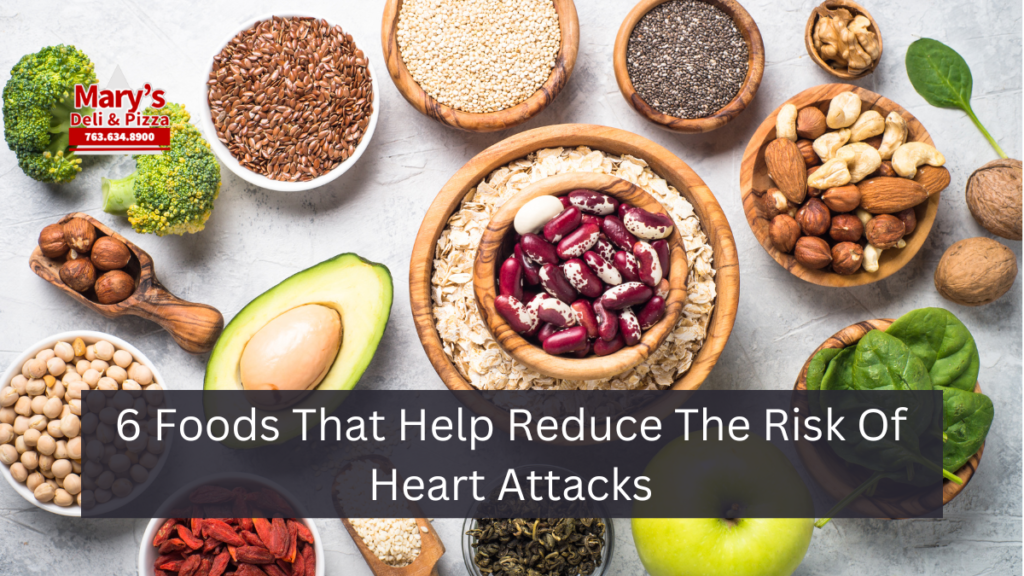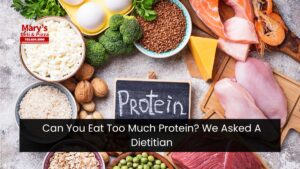Heart disease remains one of the leading causes of death globally, but the good news is that diet plays a significant role in reducing the risk. Research shows that certain foods can help lower blood pressure, reduce cholesterol, and maintain a healthy weight—all factors that reduce the risk of heart attacks.
Here are six foods that are proven to support heart health and help reduce the risk of heart attacks.
1. Fatty Fish
Why Fatty Fish Are Good For Your Heart
Fatty fish like salmon, mackerel, sardines, and trout are rich in omega-3 fatty acids, essential nutrients that help reduce inflammation, lower triglyceride levels, and prevent irregular heartbeats.
Omega-3s also help reduce plaque buildup in the arteries, which can lead to heart disease. Studies show that people who consume fatty fish regularly have a lower risk of heart attacks and sudden cardiac death.
How To Incorporate Fatty Fish Into Your Diet
- Eat two servings of fatty fish each week.
- Grill or bake salmon with olive oil and herbs for a heart-healthy meal.
- Add canned sardines to your salads or whole grain toast for a quick and nutritious snack.
2. Leafy Green Vegetables
Nutritional Power Of Leafy Greens
Leafy greens like spinach, kale, and Swiss chard are loaded with essential vitamins, minerals, and antioxidants. These vegetables are particularly high in vitamin K, which helps protect your arteries and promote proper blood clotting.
Leafy greens are also rich in dietary nitrates, compounds that have been shown to lower blood pressure and reduce arterial stiffness, contributing to better heart health.
How To Add More Leafy Greens To Your Diet
- Add a handful of spinach or kale to your smoothies.
- Incorporate leafy greens into your salads, stir-fries, or soups.
- Substitute lettuce with darker greens like Swiss chard or arugula in your sandwiches.
3. Whole Grains
Benefits Of Whole Grains For Heart Health
Whole grains such as oats, brown rice, barley, and quinoa are packed with fiber, particularly soluble fiber, which helps reduce cholesterol levels.
By lowering cholesterol, whole grains contribute to healthier arteries and reduced risk of heart attacks. They are also a good source of B vitamins, which help prevent blood clots and reduce inflammation.
Ways To Include Whole Grains In Your Diet
- Swap white bread for whole-grain bread or use whole-wheat pasta.
- Start your day with a bowl of oatmeal topped with fresh fruit and nuts.
- Incorporate quinoa or brown rice into your meals as a side dish or salad base.
4. Berries
The Heart-Boosting Power Of Berries
Berries, including strawberries, blueberries, raspberries, and blackberries, are rich in antioxidants like anthocyanins, which reduce inflammation and oxidative stress.
These antioxidants help protect the heart by improving cholesterol levels, reducing blood pressure, and preventing arterial plaque buildup. Studies suggest that regular consumption of berries is associated with a lower risk of heart disease.
How To Eat More Berries
- Add fresh berries to your breakfast cereal or yogurt.
- Enjoy them as a sweet, heart-healthy snack throughout the day.
- Use frozen berries in smoothies or as a topping for whole-grain waffles or pancakes.
5. Nuts And Seeds
Why Nuts And Seeds Are Heart-Friendly
Nuts and seeds such as almonds, walnuts, flaxseeds, and chia seeds are excellent sources of heart-healthy fats, fiber, and protein. Walnuts are particularly high in omega-3 fatty acids, while almonds are rich in monounsaturated fats, both of which help lower bad cholesterol (LDL) and raise good cholesterol (HDL).
Regular consumption of nuts and seeds has been linked to a reduced risk of heart attacks and other cardiovascular diseases.
How To Incorporate Nuts And Seeds Into Your Diet
- Add a handful of nuts or seeds to your salads, oatmeal, or yogurt.
- Snack on raw or lightly roasted almonds or walnuts.
- Blend flaxseeds or chia seeds into smoothies for a fiber and omega-3 boost.
6. Avocados
Heart Benefits Of Avocados
Avocados are packed with monounsaturated fats, which have been shown to lower bad cholesterol levels and reduce the risk of heart disease. They are also rich in potassium, a nutrient that helps regulate blood pressure by balancing the effects of sodium in the body.
Additionally, avocados contain a wealth of antioxidants and vitamins that contribute to overall heart health.
How To Enjoy More Avocados
- Spread avocado on whole-grain toast for a nutritious breakfast or snack.
- Add diced avocado to your salads, tacos, or grain bowls.
- Make homemade guacamole and pair it with whole-grain crackers or veggie sticks.
Table: Nutritional Benefits Of Heart-Healthy Foods
| Food | Key Nutrients | Heart Health Benefits |
|---|---|---|
| Fatty Fish | Omega-3 fatty acids | Reduces inflammation, lowers triglycerides, prevents arterial plaque buildup, and reduces irregular heartbeats |
| Leafy Green Veggies | Vitamin K, nitrates | Protects arteries, promotes blood clotting, reduces blood pressure, and improves arterial flexibility |
| Whole Grains | Soluble fiber, B vitamins | Lowers cholesterol, reduces blood pressure, and prevents blood clots |
| Berries | Antioxidants (anthocyanins), fiber | Reduces inflammation, improves cholesterol levels, reduces blood pressure, and prevents arterial plaque buildup |
| Nuts and Seeds | Omega-3 fatty acids, fiber, protein | Lowers bad cholesterol (LDL), raises good cholesterol (HDL), reduces the risk of heart disease |
| Avocados | Monounsaturated fats, potassium, antioxidants | Lowers bad cholesterol (LDL), regulates blood pressure, and provides antioxidant support for heart health |
Conclusion
Incorporating heart-healthy foods into your diet is an effective way to reduce the risk of heart attacks and promote overall cardiovascular health. From the omega-3-rich fatty fish to fiber-packed whole grains and antioxidant-loaded berries, these foods provide essential nutrients that support a strong and healthy heart.
By making these foods a regular part of your diet, you can enjoy flavorful meals while protecting your heart for the long term.
FAQs
1. How Often Should I Eat Fatty Fish To Reduce The Risk Of Heart Attacks?
Eating fatty fish like salmon or mackerel twice a week can significantly reduce your risk of heart attacks due to their high omega-3 content.
2. Can Leafy Greens Really Lower Blood Pressure?
Yes, the nitrates in leafy greens help relax blood vessels and reduce blood pressure, making them an excellent choice for heart health.
3. Are Whole Grains Better Than Refined Grains For Heart Health?
Absolutely. Whole grains contain more fiber and nutrients, which help reduce cholesterol levels and promote cardiovascular health.
4. How Do Berries Protect My Heart?
Berries are rich in antioxidants that reduce inflammation and prevent oxidative damage, both of which contribute to better heart health.
5. Is It Okay To Eat Nuts Every Day For Heart Health?
Yes, consuming a small handful of nuts daily can provide heart-healthy fats, fiber, and protein that support cardiovascular wellness.






